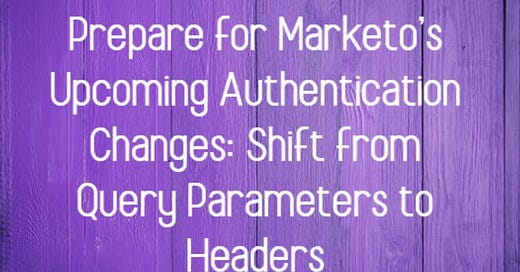In the ever-evolving landscape of API integrations, ensuring secure and reliable authentication is critical. Marketo is making an important update that will impact how you authenticate your REST API calls. If you rely on the existing method of passing access tokens via query parameters, it's time to prepare for a change.
The Shift: From Query Parameters to Headers
When making calls to REST API methods, an access token is required for every request to be successful. Traditionally, Marketo has allowed two methods for including this token:
As an HTTP Header:
Authorization: Bearer cdf01657-110d-4155-99a7-f986b2ff13a0:intAs a Query String Parameter:
https://your-instance.mktorest.com/rest/v1/your-endpoint.json?access_token=cdf01657-110d-4155-99a7-f986b2ff13a0:intHowever, Marketo is phasing out the option to include the access token as a query parameter. Going forward, all authentication must be done using the HTTP Authorization header.
Why This Change Matters
Moving away from query parameters to headers is a significant shift for a couple of reasons:
Security: Embedding access tokens in the URL (as query parameters) can expose them in browser history, logs, or referral headers, increasing the risk of token leakage. Using headers ensures that tokens are sent securely as part of the HTTP request, which is generally not logged or cached.
Industry Best Practices: Many modern APIs have moved away from query parameters for authentication due to security concerns, and this update aligns Marketo with these best practices.
What You Need to Do
If your current integration relies on passing the access token in a query parameter, immediate action is required:
Update Your Integration: Change your REST API calls to include the access token in the
Authorizationheader instead of the query string.Review Your Codebase: Ensure that no lingering calls are using the deprecated query parameter method, as this will lead to failed API requests once the change is enforced.
Tips and Best Practices for Token Management
Beyond just updating your authentication method, it's essential to manage your access tokens effectively to prevent unexpected authentication errors:
Monitor Token Expiration: Always check the token’s validity before making a REST API call. If the token is close to expiring, renew it by calling the Identity endpoint. This preemptive check ensures that your API calls don’t fail due to an expired token.
Handle Errors Gracefully: If a REST call fails due to an expired (602 error) or invalid (601 error) token, immediately renew the token and retry the request. This approach minimizes downtime and keeps your integration running smoothly.
Conclusion
Marketo’s shift to requiring access tokens in HTTP headers reflects a broader industry move towards more secure authentication practices. By updating your integration now, you’ll not only comply with the upcoming changes but also improve the security and reliability of your API interactions. Make the transition today to avoid disruptions and keep your Marketo integrations running seamlessly.
For further guidance, refer to Marketo's API documentation and ensure your systems are prepared for this update.




Hi,
We are currently using the Informatica Marketo V3 connector to interact with the Marketo API, which relies on a query-based token for authentication. When is Marketo planning to discontinue support for this authentication method?
Hi,
We are currently using the Informatica Marketo V3 connector to interact with the Marketo API, which relies on a query-based token for authentication. When is Marketo planning to discontinue support for this authentication method?